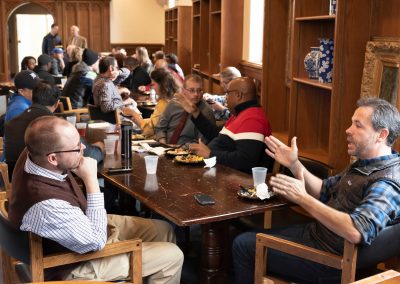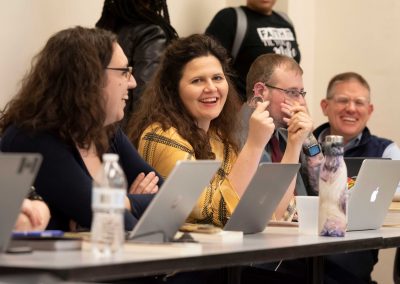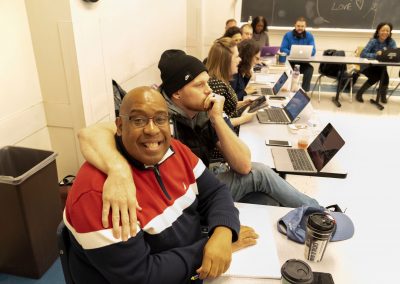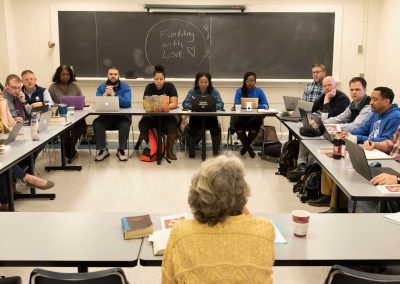"The Cohort Is Your Family"
Collaboration, challenge, and camaraderie in the D.Min. at DukePhotography by Les Todd
The Doctor of Ministry (D.Min.) program at Duke Divinity School engages pastors and leaders of other Christian institutions in rigorous and imaginative theological reflection as they continue to serve in their current ministerial roles. The degree, which combines intensive on-campus sessions with live online learning, offers Christian leaders the flexibility they need to earn a doctorate without leaving their positions.
Each year, the D.Min. program welcomes a cohort of students from a variety of backgrounds, including pastors, leaders in church-related institutions or higher education, and other professionals seeking advanced theological training.
The D.Min. curriculum is offered in a hybrid residency format, which requires students to be on campus at Duke five times over the course of two years for week-long residential seminars. The residencies are each followed by eight weeks of group interaction and structured distance learning during which students regularly engage with one another and with faculty, facilitated by online tools. Some tools help students work on their own time; others require students to meet online at specific times for engagement with professors and their class.
“I have found, in my own teaching in the program, that the cohort model is the optimum way for pastors and leaders to grow in their self-confidence and knowledge of best practices and to give and to receive honest feedback.”
—Will Willmon, professor of the practice of Christian ministry and director of the D.Min. program
Assignments require students both to engage the church’s Scriptures and traditions and to integrate them with the ecclesial practices that are part of their daily life. This work is not done in isolation but as part of a conversation with the community of peer scholar-practitioners formed during the residential intensives and sustained through online communication.

Will Willimon talks to Daniel Corpening during a lunch for D.Min. students
Each cohort is assigned a cohort mentor, who guides spiritual formation and offers other forms of support to students throughout the program. Students and cohort mentors participate in community worship and meet daily during the residencies. Cohort mentors are available throughout the program to serve as a resource for students.
Our students flourish with small cohort sizes, a hybrid learning environment, and spiritual formation mentors. Engagement with distinguished faculty, an emphasis on generating innovative research-based theses, and a commitment to leadership in service to the church make the Duke Divinity School D.Min. an excellent choice.
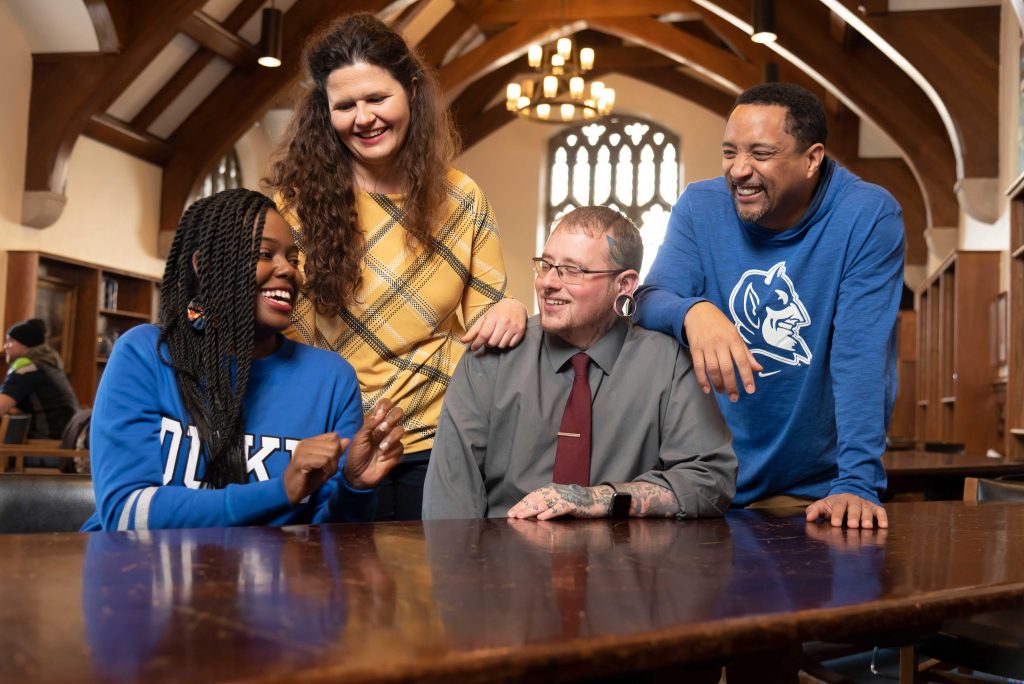
“The members of my cohort are all very different but we share a passion for pastoring and a passion for our communities. I am in regular conversation with many of them; I have just started a new church in Brooklyn, New York, and I have many long days and nights. Knowing that my cohort is thinking of me and checking in makes those days and nights so much easier! As a church planter, much of my work is done in such an individual way that I don’t always have regular opportunities to speak to colleagues on the job. The feedback and camaraderie of my D.Min. cohort in this season of my ministry is one of the program’s greatest blessings to my life.”—Gabby Cudjoe Wilkes, founding co-lead pastor at The Double Love Experience in Brooklyn, N.Y.C.
[pictured above, l. to r.: Gabby Cudjoe Wilkes, Rochelle Webster, Angel Collie, and Julio Andujo, all members of the first-year cohort]
Fumbling with Love
Rochelle Webster, senior pastor at Paradise Valley SDA Church in National City, Calif., described how her D.Min. cohort enriches her ministry: “I have just accepted a call to lead an incredibly diverse church community, with members who come from all over the world. In my D.Min. cohort, we have diverse experiences surrounding issues of race, gender, class, politics, and faith—and I love being a part of this cohort. I love the way in which this group challenges me to see from different perspectives and checks some of my blind spots and presuppositions. I love how supportive and kind people are. I love how even when we sometimes fumble with our words, both listener and speaker strive to recognize that we are ‘fumbling with love’ (to quote a phrase one of our cohort used to describe what grace-filled communication looks like).
“There is a very real synergy between being in the thick of ministry, in all its beautiful complexity and messiness and immediacy, and having a designated time and space to consider big picture questions. What is the state of the church today? What is it called to look like in the 21st century? I feel incredibly blessed to be able to learn from such well-respected scholars at Duke and to have a cohort of 20 other faith leaders who are walking this journey with me.”
“I love the church, but my life has been profoundly shaped by both its promise and failures. One of the tensions that I am seeing not only in my denomination but in our larger world today is this: is there a way to hold differing convictions, and still love each other well? More specifically, can we shape deeply committed communal identities that are capable of holding themselves accountable to their primary task of witness to the coming Triune God, while still allowing for very real differences in perspectives and beliefs (or, in fact, seeing that very diversity as part of their witness)?”—Rochelle Webster, senior pastor at Paradise Valley SDA Church and D.Min. candidate
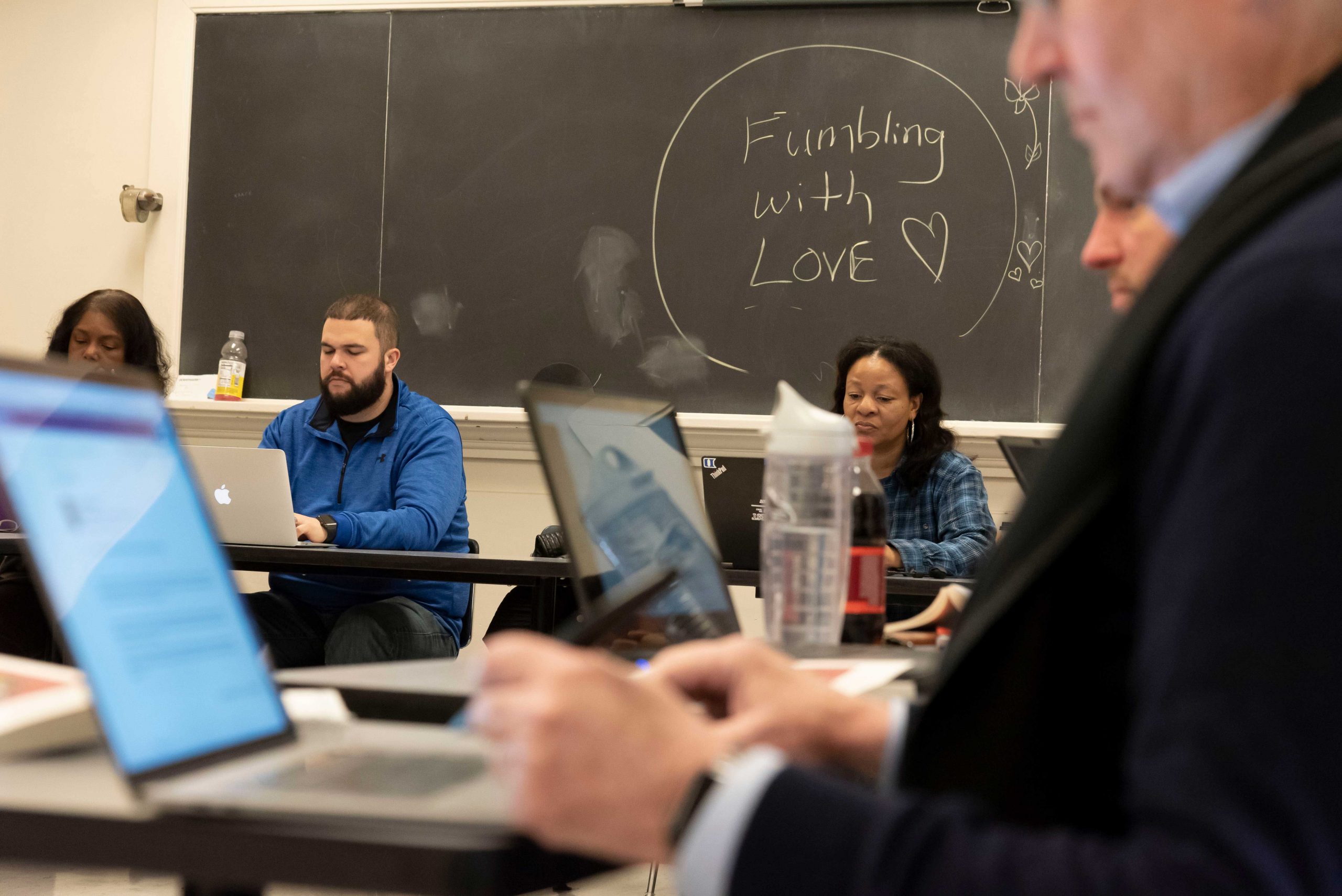
A Continuing Cohort
The relationships and networks of support provided by the cohort model don’t end after graduation, as D.Min. alumni attest. Victoria White D.Min.’16, managing director of grants at Leadership Education at Duke Divinity, describes her own ongoing cohort experience: “The D.Min. has provided me with an amazing cadre of colleagues to whom I can turn for support, resources and reflection. Even three years out of the program, I still have a group text a number of us engage on a weekly basis for support, fun, resources and care. These ministers are at the top of their game and they know they didn’t get there alone. We all know we are stronger together and so we rely on one another for truth, honesty, reflection and ideas.These are folks I call on to speak at events- because they are experts in their field. I know I can trust them and they know my context, after studying together for years.”
“The interdenominational interdisciplinary cohort of colleagues is priceless. I studied next to denominational executives, senior pastors, community organizers, chaplains, writers and activists who looked, spoke and reasoned in dramatically different ways than myself. They made me better at everything because I wasn’t allowed to take anything for granted. We pushed each other because when one rises, we all rise.”—Victoria White D.Min.’16
Alumni Describe Their Cohort Experience
In addition to excellent faculty, the ability to study while staying in their place of ministry, and rigorous, practical courses, Duke D.Min. students and alumni describe their cohort of fellow students as the greatest surprise and ongoing source of support.
“My cohort was such a gift. We encouraged and challenged one another. The diversity of my cohort was invaluable.”
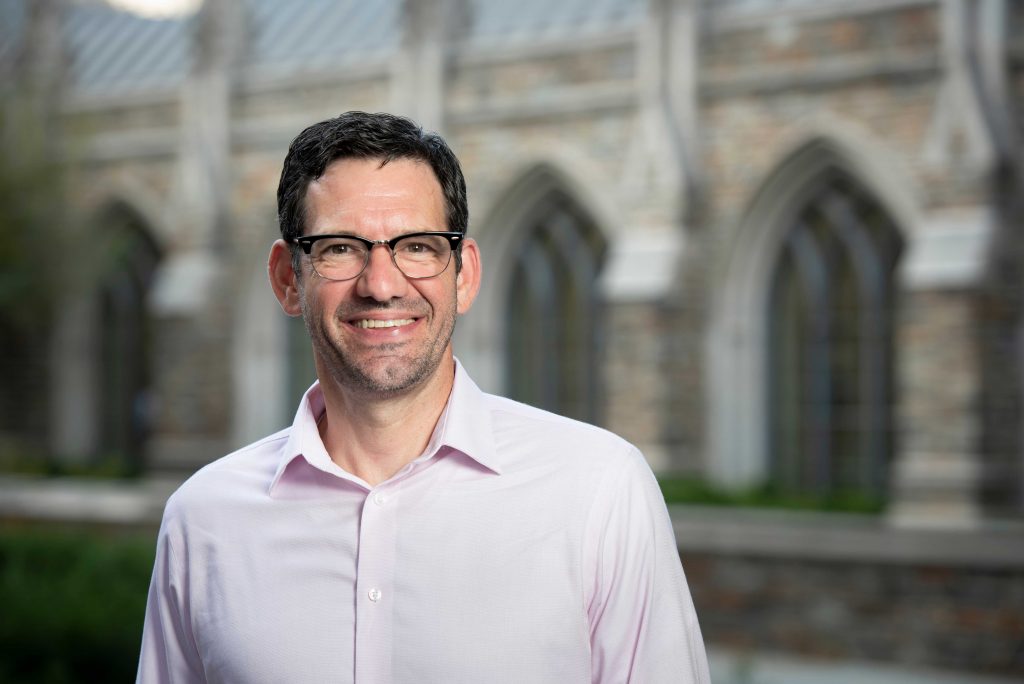
Clay Thomas D.Min.’16, pastor of Rivermont Presbyterian Church in Chattanooga, Tenn.
“We laughed, we cried, we stretched and were stretched, we had times we didn’t know if we would make it. The cohort became family. We shared things we wouldn’t have in a normal class. I would have been lost without my writing group during the thesis part of the program. We had already bonded during the courses, but it was during the thesis research and writing that we really shared on a deeper level. Without these people, Laughter and tears, frustrations and breakthroughs—we kept each other going when we began to have thoughts of giving up.”

Sean Turner D.Min.’19, pastor at Hill’s Chapel UMC in Stanley, N.C.
“My cohort is the biggest surprise I have had in the whole program. I love each of them so much. For me, up to this point, education has often been an individual endeavor. Studying, writing, and presenting were educational opportunities when I could compete. I could prove my worth by getting good grades, showing what I know, and working on my ideas. My cohort has helped me experience learning as collaborative rather than competitive. They have taught me so much more than I ever imagined, and certainly more than I feel like I taught them.”
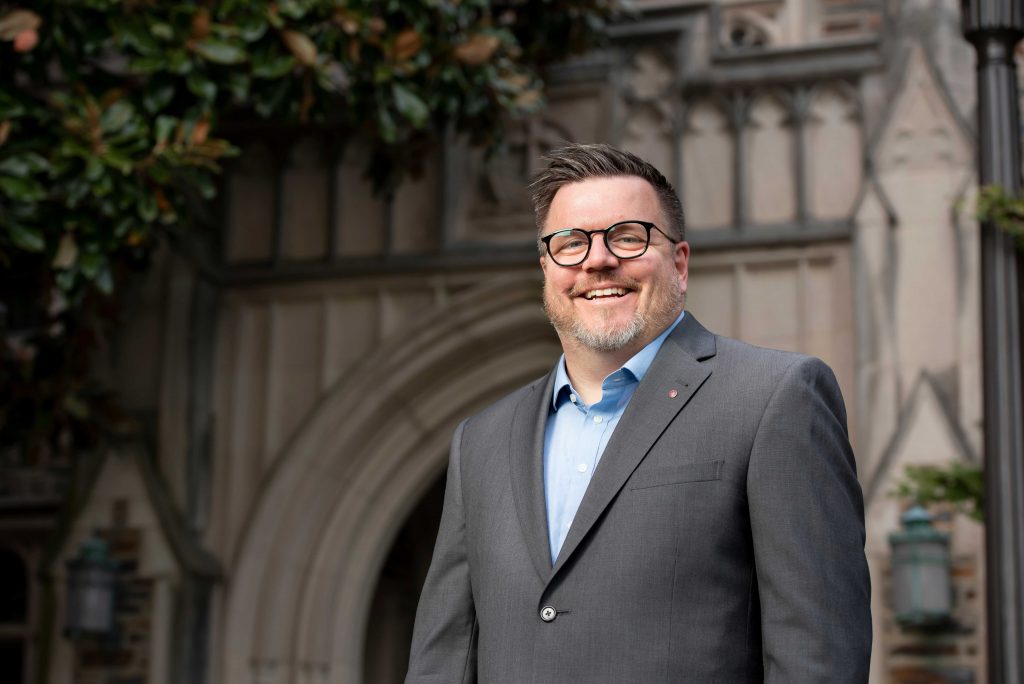
Chris Aho, D.Min. candidate and pastor at Oxford Baptist Church in Oxford, N.C.
Strength Through Diversity
A Duke D.Min. cohort includes students who might be pastors, organizational leaders, nonprofit managers, or chaplains in different ecclesial denominations and geographic locations. The wide-ranging diversity of each cohort is a strength of the program, argues Angel Collie, assistant director of the Center for Sexual and Gender Diversity at Duke University and first-year D.Min. student.
“We are diverse in many different ways as we come from a wide range of backgrounds, traditions and identities. I think our differences in theology and experience have been a real strength for us as a cohort. There have been hard conversations and mistakes have been made as folks learn and grow, but I think we support each other and come to the conversations we have from a place of love. As a person with multiple marginalized identities I’m often anxious about what the process of being part of a group might mean, and I’ve found the cohort overall has been open to learning, growth, and feedback when it is needed.”
